Top-15 PPC Tools for Research, Automation & Optimization
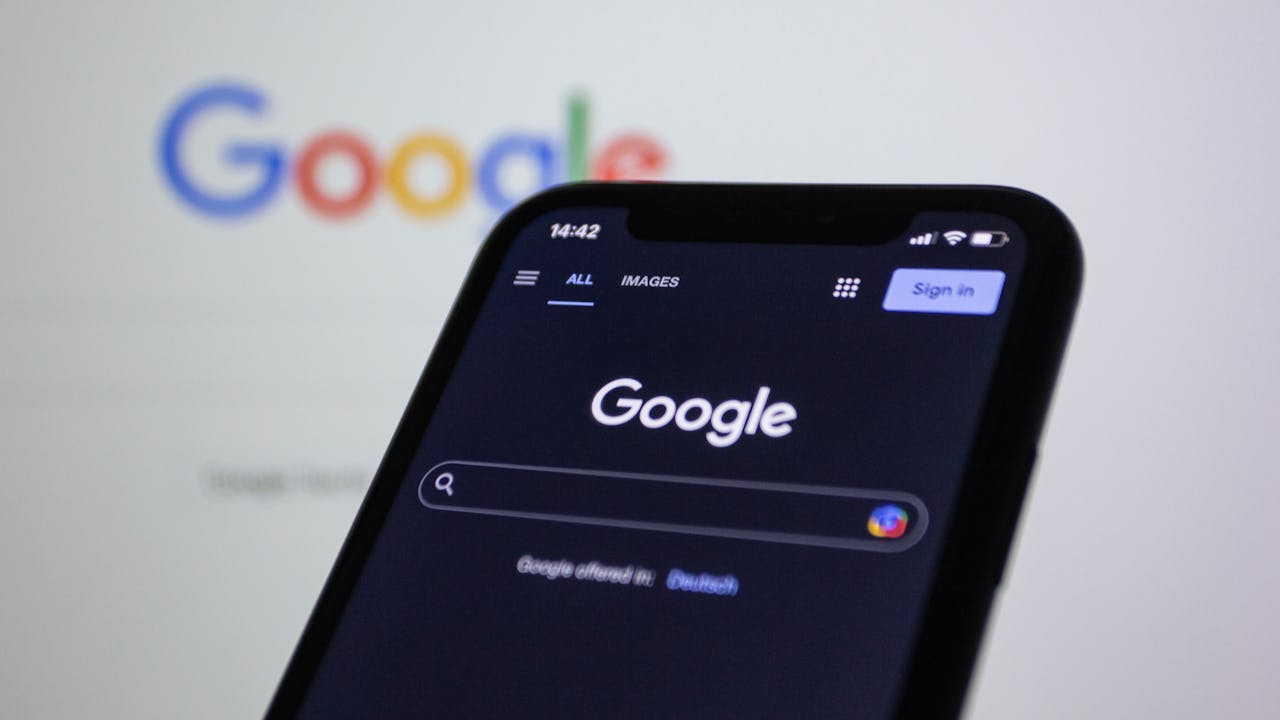
Running pay-per-click (PPC) is both an art and a science. The right PPC tools help automate repetitive tasks, improve bidding, refine targeting, and analyze performance. Did you know that businesses earn an average of $8 for every $1 spent on Google Ads? That kind of ROI isn’t luck - it’s smart optimization.
If you’re managing ads, researching competitors, or scaling campaigns, these 15 essential PPC tools will save you time and maximize results.
How PPC Tools Save You Time and Maximize ROI
PPC tools automate repetitive tasks such as bid adjustments, keyword research, and performance tracking, saving marketers valuable time. With tools like Google Keyword Planner and Google Ads Editor, businesses can streamline campaign management, refine keyword grouping, and gain precise insights to improve their strategies.
These tools also facilitate competitor research, allowing businesses to identify market opportunities and optimize their ad placement for maximum effectiveness. Integrating platforms like Looker Studio enables a holistic view of ad performance and ad conversion measurement, ensuring that campaigns are data-driven and results-oriented.
Our Real PPC Success Stories
Leading Online Furniture Retailer
Challenge: Declining ROAS and stagnating account growth
Tools & Tactics:
- Bing Ads Editor: Cleaned up the account and launched optimized Shopping campaigns
- Performance Max: Leveraged data to identify top-performing product categories and restructure campaigns
- Budget Reallocation Tools: Shifted spend to high-performing areas while eliminating waste
Results:
- ROI improved from 4.8 to 8.5 within one month
- Established a foundation for a comprehensive, post-peak campaign overhaul
Home & Décor eCommerce Brand
Challenge: Underwhelming Black Friday performance from the previous year
Tools & Tactics:
- Ad Scheduling & Automation Tools: Launched early campaigns to build momentum ahead of peak shopping days
- Dynamic Budget Management: Used our PPC management tools to ramp up spending in real time and capture peak demand
Results:
- Black Friday revenue increased by 68%
- Cyber Monday revenue saw a 26% surge, marking record-breaking performance
Explore the 15 Best PPC Tools for Marketers
Core PPC Tools
- Google Ads Editor (Free) - Bulk Campaign Management
- Google Keyword Planner (Free) - Keyword Research and Campaign Planning
- Microsoft Advertising Editor (Free) - Managing Bing Ads Campaigns
- Meta Ad Library (Free) - Competitor Analysis on Meta Platforms
Best All-in-One Tools
- Semrush ($139+/month) - Competitive PPC & Keyword Research
- Optmyzr ($249+/month) - PPC Automation & AI Optimization
- AdEspresso ($49+/month) - Social Media PPC Management
Best PPC Testing & Optimization Tools
- Optimizely (Custom Pricing) - A/B Testing for PPC Landing Pages
- Adalysis ($149+/month) - PPC Ad Testing & Quality Score Optimization
- SpyFu ($39+/month) - Competitor PPC Insights
- iSpionage ($59+/month) - PPC Competitor Research & Landing Page Insights
PPC Fraud Prevention & Reporting Tools
- CHEQ Essentials ($149+/month) - Click Fraud Prevention
- ReportGarden ($89+/month) - Easy PPC Reporting
eCommerce PPC Tools
Best PPC Tools for Research & Optimization
1. Google Ads Editor
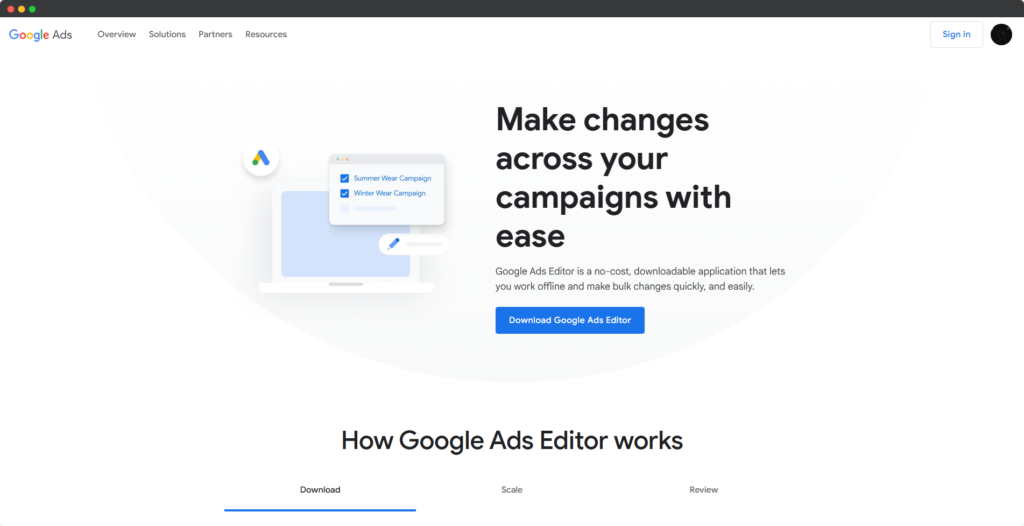
Google Ads Editor is a powerful tool designed for managing large-scale Google Ads campaigns. It allows advertisers to make bulk edits to campaigns, ad groups, keywords, and more, all from an offline environment. This makes it an essential tool for marketers handling multiple accounts or high-volume campaigns, as it streamlines workflow and speeds up the editing process.
Google Ads Editor Pros:
- Supports offline editing.
- Allows bulk actions.
- Advanced search and replace functionality.
- Continuous updates and new features from Google.
Google Ads Editor Cons:
- Can have a steep learning curve for new users.
- Limited to Google Ads campaigns, with no multi-platform support.
- Some advanced features, like real-time metrics, require the online Google Ads interface.
- Requires syncing with the online platform to update changes.
Google Ads Editor Pricing: Free
2. Google Keyword Planner
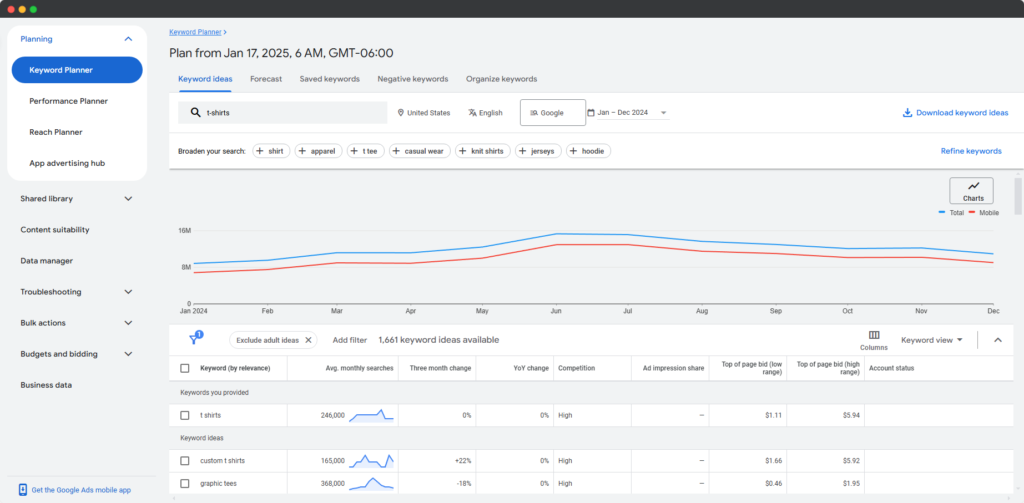
Google Keyword Planner is a fundamental tool for PPC advertisers. It provides insights into keyword search volumes, competition levels, and cost-per-click data. This tool is essential for identifying the right keywords to target in campaigns, ensuring that your ads reach the right audience.
Google Keyword Planner Pros:
- Provides keyword search volumes directly from Google’s database.
- Offers CPC estimates to plan budgets effectively.
- Includes keyword suggestions to expand your campaigns.
- Allows filtering by location, language, and search network for targeted insights.
Google Keyword Planner Cons:
- Search volume ranges can sometimes be broad, reducing precision.
- Lacks advanced competitor analysis features.
- Limited integration with non-Google platforms for multi-channel campaigns.
Google Keyword Planner Pricing: Free
3. Microsoft Advertising Editor
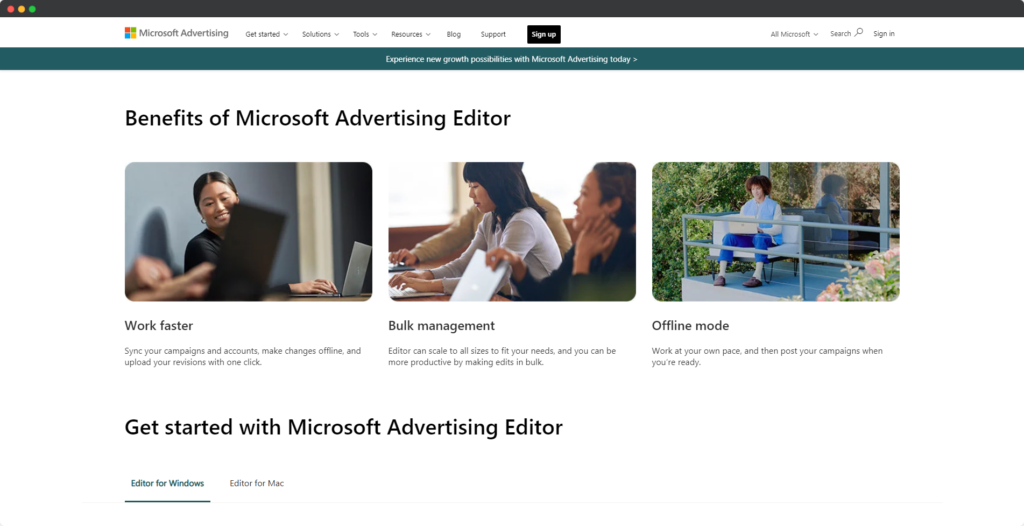
Microsoft Advertising Editor is a desktop application designed to simplify the management of Microsoft Advertising (formerly Bing Ads) campaigns. This tool allows marketers to create, edit, and optimize campaigns offline, making it ideal for bulk editing and efficient campaign management across Microsoft’s ad platform.
Microsoft Advertising Editor Pros:
- Supports offline editing.
- Facilitates bulk updates to campaigns, ad groups, keywords, and bids.
- Includes advanced targeting options specific to Microsoft Advertising, such as demographic and device targeting.
- Regularly updated with new features by Microsoft.
Microsoft Advertising Editor Cons:
- Limited to Microsoft Advertising campaigns, with no support for other platforms.
- Smaller market share compared to Google Ads, reducing potential reach.
- Requires syncing with the online interface to ensure real-time campaign data.
- Fewer third-party integrations compared to Google’s ecosystem.
Microsoft Advertising Editor Pricing: Free
4. Meta Ad Library
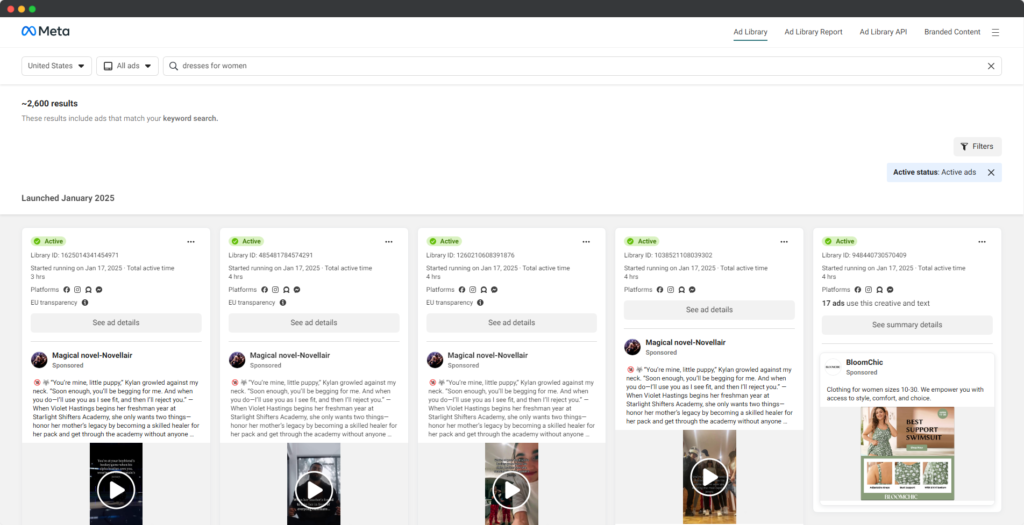
Meta Ad Library is a transparency tool provided by Meta (formerly Facebook) that allows users to explore all active ad campaigns running across Meta’s platforms, including Instagram. It provides insights into competitors’ ads, creative strategies, and messaging, making it an invaluable resource for marketers looking to optimize their campaigns or gather inspiration.
Meta Ad Library Pros:
- Accessible to anyone, even without a Meta account.
- Offers a comprehensive view of active ads across Facebook, Instagram, Messenger, and Audience Network.
- Great for competitor research and creative inspiration.
- Allows filtering by location, platform, and ad category.
Meta Ad Library Cons:
- Does not provide performance data like impressions or clicks.
- Search functionality is basic and sometimes less intuitive.
- Does not offer analytics or actionable insights beyond what’s visible in the library.
Meta Ad Library Pricing: Free
Best All-in-One PPC Tools
5. Semrush
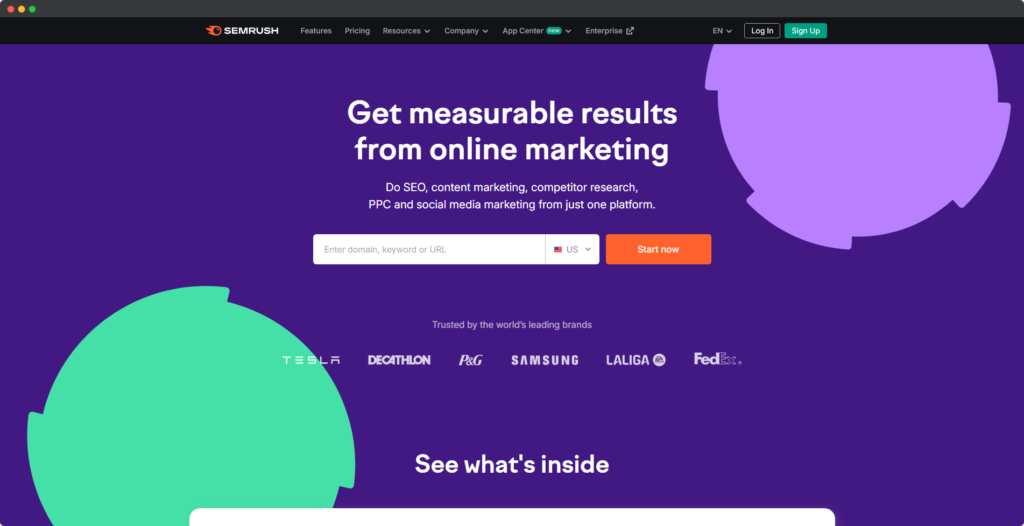
Semrush is an all-in-one digital marketing platform that offers a wide range of tools for PPC and competitive analysis. It is particularly useful for managing PPC campaigns by providing keyword research, ad copy analysis, and competitor insights. Its multi-channel capabilities make it a favorite among marketers looking to integrate PPC with broader digital strategies.
Semrush Pros:
- Comprehensive keyword research tools, including CPC, competition level, and search volume data.
- Detailed competitor analysis, allowing you to see your competitors' top-performing keywords and ads.
- Multi-channel campaign support, covering Google Ads, Bing Ads, and social media platforms.
- Advanced reporting and analytics features.
Semrush Cons:
- Pricing can be high for small businesses or individual marketers.
- PPC-focused features are strong but not as specialized as some PPC-only tools.
- Requires time to customize and optimize the tools for your specific needs.
Semrush Pricing: starts at $140/month (Pro Plan) – for small teams or individuals.
6. Optmyzr
Optmyzr is a leading PPC management tool designed to automate and optimize pay-per-click campaigns. It is particularly well-suited for agencies and advertisers managing large ad spends, offering advanced tools for bid adjustments, campaign performance analysis, and reporting. With its rule-based automation, Optmyzr helps save time while improving ROI.
Optmyzr Pros:
- Automates bid management, ad testing, and account optimizations.
- Supports automation rules to match your specific campaign goals.
- Integrates with Google Ads, Microsoft Advertising, and other platforms.
- Allows to identify trends and opportunities with visual dashboards.
Optmyzr Cons:
- Pricing can be expensive for smaller teams or businesses.
- A steep learning curve for beginners due to its vast array of features.
- Relies on existing campaign setup quality (poorly configured campaigns may limit its effectiveness).
Optmyzr Pricing: starts at $299/month (Essential Plan) – for small teams managing one or a few accounts.
7. AdEspresso
AdEspresso is a user-friendly PPC tool designed to simplify the management of social media ad campaigns across Facebook, Instagram, and Google Ads. Known for its intuitive interface and powerful A/B testing capabilities, it’s a favorite among small to mid-sized businesses looking to optimize their social media advertising efforts.
AdEspresso Pros:
- Simplifies campaign creation with easy-to-use templates and tools.
- Offers A/B testing features.
- Provides detailed analytics and insights.
- Supports collaboration by allowing multiple team members to work on campaigns simultaneously.
- Integrates seamlessly with Facebook, Instagram, and Google Ads, making it a versatile tool for social media campaigns.
AdEspresso Cons:
- Primarily focused on social media advertising, with limited functionality for other PPC platforms.
- Some advanced features may require additional learning to fully utilize.
AdEspresso Pricing: starts at $49/month (Starter Plan) – for individuals or small businesses.
Specialized PPC Tools
8. Optimizely
Optimizely is a leading experimentation and optimization platform designed to improve website and landing page performance. It allows marketers to conduct A/B tests, multivariate tests, and personalization campaigns to enhance user experience and drive higher conversions.
Optimizely Pros:
- Offers robust A/B and multivariate testing.
- Provides personalization features to tailor user experiences based on behavior and preferences.
- Integrates with various analytics and marketing platforms for deeper insights.
- Easy-to-use interface suitable for teams with varying levels of technical expertise.
- Scalable solution for businesses of all sizes, from startups to enterprises.
Optimizely Cons:
- Focuses on website optimization, so it’s not directly a PPC management tool.
- Results can depend on the quality of the tests designed, which requires strategic input.
Optimizely Pricing: custom pricing based on business size and feature requirements.
9. Adalysis
Adalysis is a PPC tool built specifically for automating and optimizing ad testing. Designed to simplify the split-testing process for Google Ads and Microsoft Advertising campaigns, Adalysis helps marketers identify underperforming ads, uncover winning variations, and maintain high-performing campaigns with minimal effort.
Adalysis Pros:
- Automates A/B testing.
- Identifies underperforming ads and recommends optimization actions.
- Offers detailed quality score analysis to improve overall campaign efficiency.
- Includes account-wide health checks to identify common issues and missed opportunities.
- Saves time with bulk optimizations.
Adalysis Cons:
- Limited to Google Ads and Microsoft Advertising, with no support for other PPC platforms.
- Focused primarily on ad testing, lacking broader campaign management features.
- Interface feels outdated compared to other tools.
Adalysis Pricing: starts at $149/month for accounts spending up to $50,000 monthly.
10. SpyFu
SpyFu is a competitive intelligence tool designed to help marketers uncover their competitors’ PPC and SEO strategies. It provides insights into competitors’ ad copy, keywords, and budget estimates, making it a powerful resource for refining your own campaigns.
SpyFu Pros:
- Provides detailed insights into competitors’ PPC campaigns.
- Offers keyword research tools.
- Includes historical data, allowing you to analyze long-term competitor trends.
- Combines PPC and SEO insights, making it a versatile tool for integrated strategies.
SpyFu Cons:
- Data accuracy can vary, especially for smaller competitors with lower ad spend.
- Interface feels cluttered due to the variety of data provided.
- Focused primarily on competitor research, with fewer tools for ongoing campaign optimization.
SpyFu Pricing: starts at $39/month for Basic Plan.
11. iSpionage
iSpionage is a competitive intelligence tool focused on PPC campaigns and landing page analysis. It provides valuable insights into competitors’ keyword strategies, ad copy, and landing page designs, helping marketers refine their own campaigns. With its emphasis on actionable data, iSpionage is a go-to tool for improving ad performance and creating high-converting landing pages.
iSpionage Pros:
- Offers detailed competitor keyword data, including PPC ad copy and bid estimates.
- Includes landing page intelligence to help optimize design and user experience.
- Tracks competitors’ ad performance over time, offering insights into long-term strategies.
- Provides proprietary metrics like the “KEI (Keyword Effectiveness Index)” for evaluating keyword quality.
- Easy-to-use interface with clear visualizations of competitor data.
iSpionage Cons:
- Limited to PPC and landing page analysis, lacking broader campaign management tools.
- Data coverage may be less comprehensive for smaller niches or local competitors.
iSpionage Pricing: starts at $59/month (Starter Plan) – for individuals or small businesses
12. CHEQ Essentials
CHEQ Essentials is a click fraud prevention tool designed to protect your PPC campaigns from invalid traffic. It uses advanced algorithms and real-time data to detect and block fraudulent clicks, ensuring that your ad spend goes toward reaching genuine, high-quality audiences.
CHEQ Essentials Pros:
- Detects and blocks fraudulent clicks in real time, reducing wasted ad spend.
- Protects against various types of invalid traffic, including bots and malicious users.
- Offers detailed reporting and insights into fraudulent activity.
- Integrates with major platforms like Google Ads and Facebook Ads.
- Easy to set up and use.
CHEQ Essentials Cons:
- Focused exclusively on click fraud prevention.
- Requires monitoring to understand and act on detailed reports effectively.
- May not cover all platforms if you’re running campaigns outside major ad networks.
CHEQ Essentials Pricing: starts at $149/month for up to 5 websites and 100,000 yearly visits.
13. ReportGarden
ReportGarden is a reporting and client management tool tailored for digital marketing agencies. It simplifies the creation of professional, customizable reports for PPC campaigns, SEO, and social media.
ReportGarden Pros:
- Customizable report templates for PPC, SEO, and social media.
- Supports integration with major platforms like Google Ads, Microsoft Advertising, and Facebook Ads.
- Includes features like proposal creation, invoicing, and campaign performance tracking.
ReportGarden Cons:
- Primarily focused on reporting.
- Advanced customization options require some experience.
- Limited support for niche platforms outside major advertising networks.
ReportGarden Pricing: starts at $75/month with some usage limits.
eCommerce-Specific PPC Tools
14. AiHello
AiHello is an Amazon PPC tool designed to automate and optimize eCommerce advertising campaigns. Using advanced AI algorithms, it helps sellers manage and scale their Amazon Ads by automating bids, identifying high-performing keywords, and improving ad placement.
AiHello Pros:
- Automates bid adjustments.
- Identifies high-performing keywords and negative keywords.
- Provides real-time performance tracking with insights.
- Scales easily for businesses of all sizes, from small sellers to enterprise-level accounts.
AiHello Cons:
- Limited to Amazon.
- Advanced features require a learning curve for new users.
AiHello Pricing: starts at $175/month (Pro Plan) for $1,000 ad spend or less.
15. Channable
Channable is an advanced eCommerce feed management tool that helps businesses create, optimize, and manage product feeds for PPC campaigns across multiple platforms. It simplifies the process of listing products on marketplaces, comparison sites, and advertising platforms like Google Ads and Facebook Ads.
Channable Pros:
- Automates product feed creation and updates.
- Supports integration with a wide range of platforms, including Google Ads, Meta, and Amazon.
- Allows easy filtering, categorization, and optimization of product data.
- Features rule-based automation for dynamic feed adjustments.
- Includes performance tracking to analyze the effectiveness of product listings and ads.
Channable Cons:
- Explicitly designed for eCommerce.
- Requires some learning and setup to utilize its advanced features fully.
- Limited features for ad performance optimization beyond feed management.
Channable Pricing: starts at $64/month for 500 items/products or less and scales up according to the number of products advertised.
PPC Tool Stacks by Use Case
Not every team needs all 15 tools. Here’s how to build lean, mid‑level, and advanced stacks by campaign type, budget reality, and internal skill set. Use these as starting points, then scale.
In‑House Starter (Under ~$5K/mo Ad Spend)
Stack:
- Google Ads Editor
- Google Keyword Planner
- Microsoft Advertising Editor (if on Bing)
- Looker Studio (optional reporting)
Use the native paid search tools you already have access to. Bulk edits, fast keyword expansion, and basic performance dashboards cover most early needs. Add CHEQ Essentials later if invalid clicks start to erode spend. Good entry point before committing to paid PPC management software.
Growing eCommerce Catalog (Multi‑SKU or Feed Driven)
Stack:
- Google Ads Editor
- Channable
- Optmyzr
- Performance Max (platform) reporting pipe into Looker Studio
Channable keeps product data clean across channels; Optmyzr acts as your day‑to‑day ppc optimization tool for bids, budgets, and structured tests at scale. Use bulk edits to align product groups with margin tiers. Pair data with blended ROAS views in Looker Studio for faster PPC analysis.
Amazon‑First Seller Expanding to Google & Social
Stack:
- AiHello
- Google Keyword Planner
- AdEspresso
- Channable (if feeding Google Shopping or Meta product sets)
AiHello automates Amazon PPC while you explore off‑Amazon demand. Keyword Planner helps translate marketplace search intent into paid search tools for Google. AdEspresso gives you a manageable bridge into Meta + remarketing. Use campaign exports for cross‑channel ppc analysis as you diversify
B2B Lead Gen & SaaS
Stack:
- Google Ads Editor
- Semrush
- SpyFu
- Adalysis
- Looker Studio or CRM connector
Semrush + SpyFu surface competitor messaging and intent clusters before you spend heavily; this informs structure and negatives. Adalysis keeps ad testing rolling in low‑volume environments where statistical significance is slow. Push conversion + pipeline data into Looker Studio to connect PPC analysis with demo or MQL quality inside the funnel.
High CPC or Fraud‑Prone Verticals
Stack:
- Google Ads Editor
- CHEQ Essentials
- Optmyzr
- Looker Studio anomaly alerts
When every click is expensive, filtering invalid traffic matters. CHEQ Essentials plugs the leak; Optmyzr handles bid and budget levers once traffic is cleaner. Use Looker Studio to watch cost per qualified lead and surface fraud spikes by geo or placement.
Conclusion
And there you have it! With so many powerful PPC tools, finding the right one to suit your needs has never been easier. Remember, every campaign is unique, so test different tools, gather feedback from your team, and don’t hesitate to adjust your approach as you go. Success in PPC often comes from flexibility and continuous improvement. Start exploring these tools today and take your marketing strategy to the next level!
